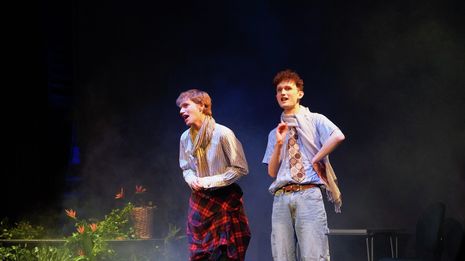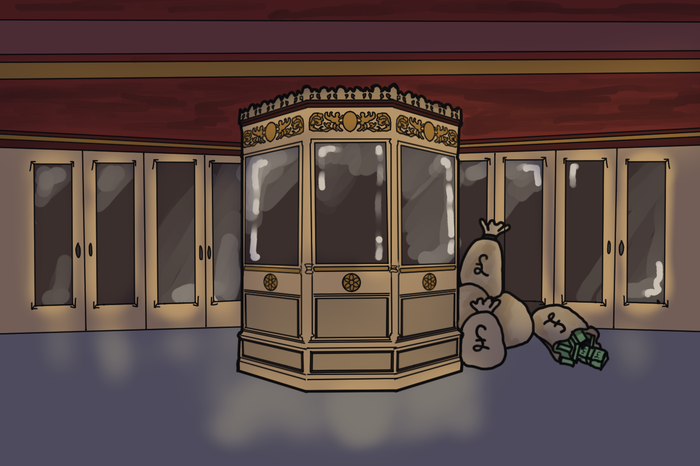Utopia Limited: a witty exploration of imperialism
Josh Pritchard finds this satirical opera is limited by its scope, even though there’s still plenty to enjoy

We Brits are pretty good at taking the mick out of ourselves. Not only is it a common pastime of today, but, as it turns out, Gilbert and Sullivan were doing it all the way back in the Victorian era. And, surprise, surprise: it’s actually aged quite well! Set on the tropical island of Utopia, Utopia Limited follows King Paramount and the rest of his court, who seek to incorporate British culture throughout their society. Adopting the advice of his recently returned daughter Princess Zara, Utopia replaces its monarchy with “corporate-style administration.” As it turns out, this is a bad idea, and revolution begins to develop in the streets. The solution is simple: adopt a “government by parties” and switch to a “limited monarchy,” instead of a “monarchy limited.”
“The play’s practical simplicity does feel like a missed opportunity to delve further into its imperialist overtones”
If it wasn’t clear, this is a very fun script, yet, in comparison to sharper, more contemporary British satires, it ends up feeling ever-so-slightly restricted. Jokes regarding Britain’s “powerful, happy, blameless” nature are most certainly relevant for today, but the more compelling material comes from the characters’ allusions to post-takeover censorship of art and media. There’s a Trumpian spectre that pervades these moments, yet the production never confronts these as boldly as a contemporary audience might anticipate. It feels like the play wants us to bring up these associations: its version of Britain is most certainly modern, peppered with spinning office chairs, references to “NFTs,” “Katie Hopkins,” and offhand mentions of “those tariffs,” but it can only go so far without deviating dramatically from its source material. This conflict between material and interpretation carries through into the production’s temporally vague depiction of Utopia. We’re shown grassy meadows and regional palaces, hear of a diverse array of animals, yet the world itself feels culturally undefined, outside of some nods to its aristocratic structure. This isn’t even necessarily a flaw, but the play’s practical simplicity does feel like a missed opportunity to delve further into its imperialist overtones.
“This production is blessed with an extraordinary cast of diverse singers, and are complemented with a suitably talented group of musicians in its band”
The music is largely excellent. This production is blessed with an extraordinary cast of diverse singers, and are complemented with a suitably talented group of musicians in its band. Conducted magnificently by Edgar Harding, the live music was spectacular, and a real testament to the energy and depth that live instruments can bring to a production. As for the actors? I could mention quite literally anyone, but there were some particular highlights. Edith Stewart came across marvellously as The Lady Sophy, able to switch seamlessly between dignified civil servant, and flirtatious suitor to Abdul Al-Rammahi’s incredible turn as King Paramount. Although not quite given as much material to work with, Eloise Eisenberg and Holly Jewitt Maurice’s performances as the Princesses Kalyba and Nekaya were extremely impressive: a marvellous duo whose voices interacted seamlessly with each others’, but the spotlight, undoubtedly, deserves to go to Wilf Offord. How dare you, Utopia Limited, tease by giving this icon a megaphone, and never letting them use it? Thrilling the Fitzpatrick Hall with their role as the mischievous Scaphio, Offord delivered a truly triple threat performance, enchanting the audience with their suave delivery and enchanting mannerisms. They also gave me a handshake upon entering through the audience, which is already the immediate highlight of my Easter Term. (My C-Sunday plans were disappointingly limited.)
The few times the music suffered were during ensemble moments, where unclear diction resulted in entire verses of songs becoming unintelligible, most notably in scenes towards the beginning and end of the first act. A similar issue arose when solos were performed from the back of the stage. It is possible to put some of these moments down to the band’s volume, but as someone who was sitting in the second row, I’m unsure how much I would have been able to understand had I been sat further back. Sadly, the Chorus also suffered throughout. Volume was a problem at several moments, and for much of the show, they seemed relegated to simplistic blocking which didn’t contribute much to the scenes they were a part of. Some were able to break the mould: Clara Eugenio Marmo’s expressive mannerisms being a minor gem amongst the entire production, but I was quite disappointed at how underutilised the Chorus sometimes felt, especially given the clear depth of strong voices that they had on display — Yuvi Vithian and Heidi Homewood being two very worthy shout-outs.
Although its merits are tempered by its simplicity and its practical faults, there is still much to enjoy with Utopia Limited. A delightful, and highly accessible, blend of musical ability, talent and performance, there is no reason at all not to treat yourself to one of the more eccentric productions CamDram has had to offer in quite a while.
A parting note: thank you, W.S Gilbert and Arthur Sullivan, for calling journalism in this opera “poor devil’s living.” I’ve never felt more seen. We can only wonder what you would have made of Britain today.
‘Utopia Limited’ was shown at the Fitzpatrick Hall from Thursday 1st to Saturday 3rd May.
Want to share your thoughts on this article? Send us a letter to letters@varsity.co.uk or by using this form.
 News / Judge Business School advisor resigns over Epstein and Andrew links18 February 2026
News / Judge Business School advisor resigns over Epstein and Andrew links18 February 2026 News / Gov grants £36m to Cambridge supercomputer17 February 2026
News / Gov grants £36m to Cambridge supercomputer17 February 2026 News / Union speakers condemn ‘hateful’ Katie Hopkins speech14 February 2026
News / Union speakers condemn ‘hateful’ Katie Hopkins speech14 February 2026 News / CUCA members attend Reform rally in London20 February 2026
News / CUCA members attend Reform rally in London20 February 2026 News / Right-wing billionaire Peter Thiel gives ‘antichrist’ lecture in Cambridge6 February 2026
News / Right-wing billionaire Peter Thiel gives ‘antichrist’ lecture in Cambridge6 February 2026










